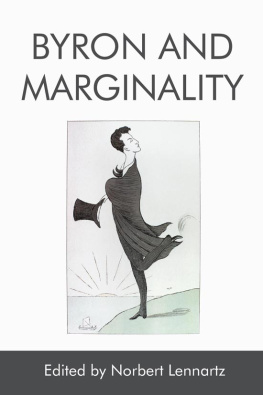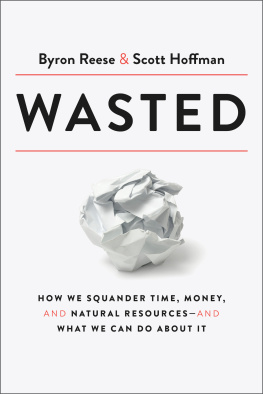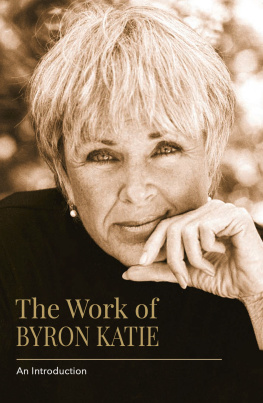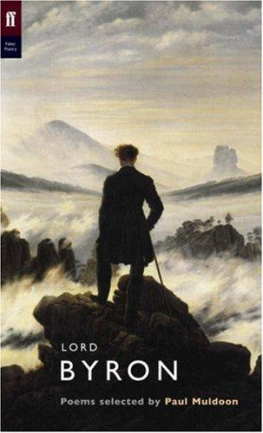
Byron and Marginality
for
Michaela, Dana, Swantje and Oliver,
young, dedicated people who have always been more
than colleagues ...
Byron and Marginality
Edited by Norbert Lennartz
EDINBURGH
University Press
Edinburgh University Press is one of the leading university presses in the UK. We publish academic books and journals in our selected subject areas across the humanities and social sciences, combining cutting-edge scholarship with high editorial and production values to produce academic works of lasting importance. For more information visit our website: edinburghuniversitypress.com
editorial matter and organisation Norbert Lennartz, 2018
the chapters their several authors, 2018
Edinburgh University Press Ltd
The Tun Holyrood Road,
12(2f) Jacksons Entry,
Edinburgh EH8 8PJ
Typeset in 11/13 Adobe Sabon by
IDSUK (DataConnection) Ltd, and
printed and bound in Great Britain.
A CIP record for this book is available from the British Library
ISBN 978 1 4744 3941 1 (hardback)
ISBN 978 1 4744 3943 5 (webready PDF)
ISBN 978 1 4744 3944 2 (epub)
The right of Norbert Lennartz to be identified as the editor of this work has been asserted in accordance with the Copyright, Designs and Patents Act 1988, and the Copyright and Related Rights Regulations 2003 (SI No. 2498).
Contents
Foreword
When Professor Norbert Lennartz invited me to open the conference at the University of Vechta, on the subject of Lord Byron and the Margins of Romanticism, I was initially puzzled. How could Byron, more widely read in England than any of the other Romantic poets, and read both in English and in translation across Europe, be at the margins of Romanticism? Yet, as the conference progressed, I began to see the scope for such an approach and started to realise how Byron does not fit so neatly into the traditional Romantic canon.
The papers from that conference have now been brought together in this book, which encourages us to approach Byron in a different and sometimes provocative way. By asking readers to look afresh at aspects of Byron that are familiar his admiration for Classical poets such as Pope and Dryden, his hostility towards many of his contemporary Romantic poets, the heavy irony and stark realism that characterise so much of his work we are invited to consider to what extent Byron can be categorised as a true Romantic.
Within the broad scope of this volume, distinguished scholars seek to examine a number of important texts sometimes marginalised in Byron studies, to explore how Byrons own self-created identity as an outsider redefines a form of Romanticism centred on rebelliousness and to reflect on the geographic marginalisation of Byrons own life outside England and his interest in the Orient.
Although I write as someone who is far from being an English literature scholar, I am sure that this volume will make an important contribution to the debate as to whether Byron was indeed marginal to Romanticism, or whether through his rebellious iconoclasm, his humour and irony, and the persona of the marginalised outsider, Byron created a new variant of Romanticism where he takes centre stage.
Robert James (Robin), Lord Byron, 13th Baron Byron
Acknowledgements
It is open to conjecture whether Byrons marginality (at least in Germany) can be proved by the fact that, after the memorable 1996 Duisburg symposium, it took almost twenty years to organise the next conference on Byron on German soil, and that the conference eventually took place not in one of the places central to German academia (such as Berlin, Munich, Cologne or Bonn, the last of which Byron cheekily rhymed with gone in Don Juan X, ll. 489 / 491) but in the marginal site of Vechta, a rural Catholic town in Lower Saxony whose three Piranesian prisons might, however, have piqued Byrons curiosity.
For three days in the June of 2014 Vechta became the centre of Byron studies, a fact that was underlined by the generous funding of the German Research Foundation (DFG) and by the presence of the current Lord Byron, who not only kindly accepted my invitation to come to Vechta but also consented to write a little Foreword for this collection of essays. My heartfelt thanks go to him, but also to the numerous, internationally acclaimed scholars who undertook to explore the paradox between industrial globalisation and rural marginality in Vechta, and to all the top-ranking Byronists who readily sent in their articles to contribute to the book as it is now. One abstract was sadly not followed by the submission of a full-length essay: unable to be present in Vechta, the late Peter Cochran had instantaneously replied to my invitation and sent in a well-argued and pertinent proposal, but his sudden and unexpected death in May 2015 foiled the completion of an essay that would have been a welcome and significant addition to the high quality of the book.
That the title of the book, Lord Byron and Marginality, was to assume a new meaning in light of the fact that its publication coincided with the hitherto unthinkable self-incurred marginalisation of Britain in Europe due to Brexit is an additional indication of the fact that the relationship between centrality and marginality has always been a dynamic one and subject to processes of constant negotiation. What Byron, the most European of all Romantic poets, would have said about Brexit in his poems and to what extent this new aspect of political and economic marginalisation would have whetted his appetite to add lacerating cantos to his Don Juan remain in the realm of speculation; that Brexit will have an impact neither on the time-honoured and indispensable cooperation between British and mainland European universities nor on the intellectual exchange among world-wide Byronists goes without saying.
In this respect, it has been a pleasure working with Michelle Houston, Adela Rauchova and Ersev Ersoy from Edinburgh University Press, whose openness to the project and their unbureaucratic way of dealing with it were always deeply appreciated. I express my gratitude to all the participants, who responded to my insistent emails with unwavering kindness and patience and put up with my pestering reminders of deadlines (which, more often than not, ran the whole gamut from dead and deadlier to deadliest).
And, last but not least, I would also like to thank my university for supporting my Byronic projects and, after my spell as a Vice-Principal of the university, for granting me my longed-for sabbatical leave in the winter of 2016/17 to put the finishing touches to the essays. The whole project would never have materialised if my editorial team in the English Department at the University of Vechta Michaela Hausmann, Dana Jahn MA, Swantje van Mark MA and Oliver Schmidt MA had not worked so diligently and steadfastly on the project and transformed a bunch of highly individual essays into a homogeneously formatted book. This book is dedicated to these four young Vechta scholars who vicariously stand for all young researchers who daily do such a great and invisible job in reconciling their postgraduate work with the time-consuming projects of their supervisors. My sincerest apologies to you for not expressing my gratitude more often.
Vechta, autumn 2017
Norbert Lennartz
Editions and Abbreviations
For reasons of standardisation, citations from Byrons primary works will appear in parentheses and refer to the editions below.
BLJ | (197394). Byrons Letters and Journals, 13 vols, ed. Leslie A. Marchand, London: John Murray. References are given with volume number and page, e.g. ( |
Next page












